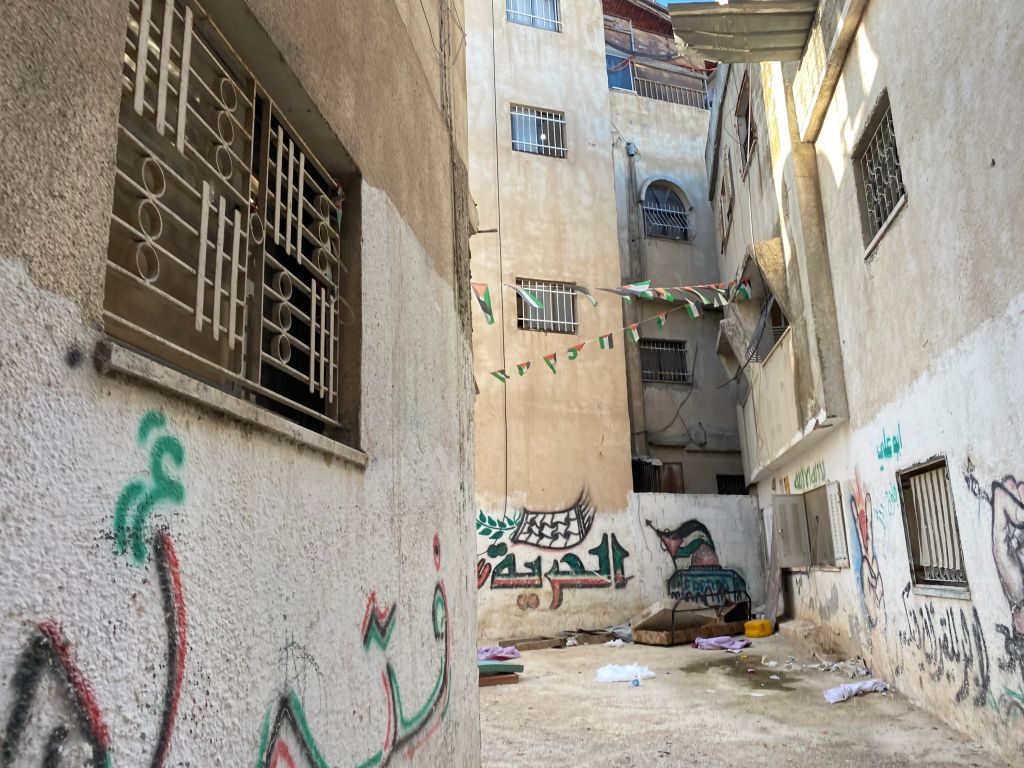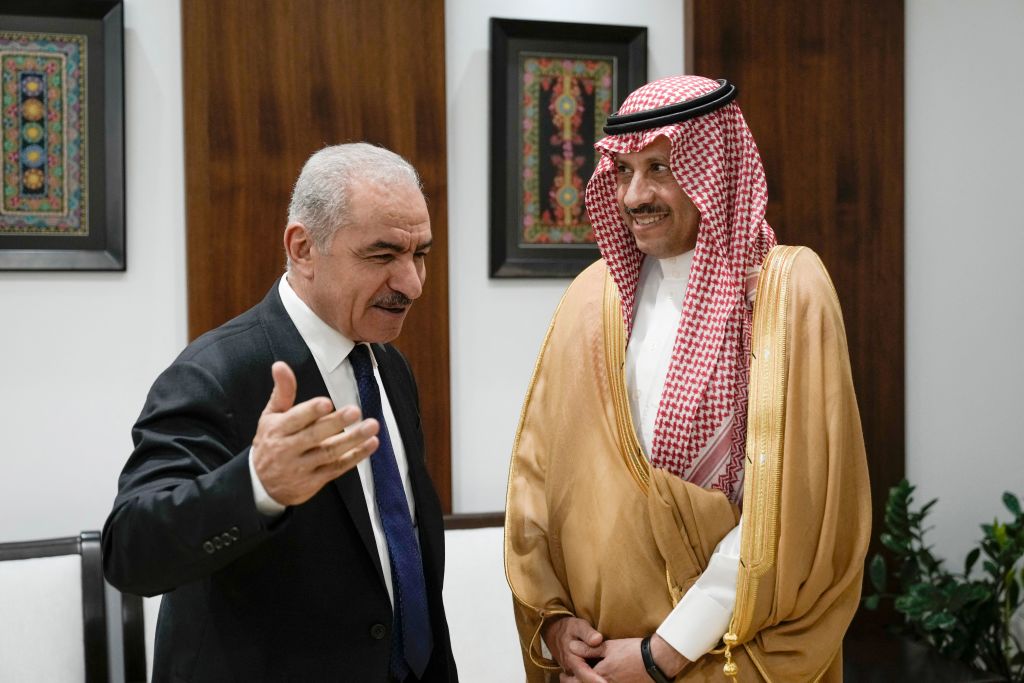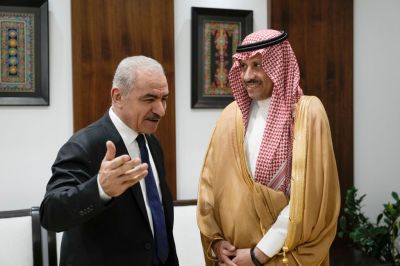RAMALLAH, West Bank—A major milestone this week marked Saudi Arabia and Israel’s continuing talks to normalize their diplomatic relations, which in itself would be an historic achievement. Israeli Tourism Minister Haim Katz arrived in Saudi Arabia on Tuesday to attend a United Nations-hosted tourism conference, the first public trip by any senior Israeli official to the kingdom.
But a different trip that received much less fanfare demonstrated Saudi Arabia’s approach to addressing a perennial challenge in the region. For the first time in more than 50 years, a Saudi delegation visited the West Bank Tuesday to meet with top Palestinian officials. The Saudis’ renewed outreach—a move in service to their reputation as the global leader of Islam—suggests the kingdom is trying to secure concessions for the Palestinians as part of its own peace with Israel. But the deteriorating legitimacy of Palestinian leadership, both among its own people and in the entire region, could stand in the way.
Saudi Arabia wants to see “a good life for the Palestinians,” the country’s de facto ruler, Mohammed bin Salman, said in a recent interview. At this stage in the negotiations, that seems to include increased economic support, possible restrictions on Israeli settlement building in the West Bank, and lip service to the future prospect of a two-state solution. But concrete commitments to Palestinian statehood don’t appear to have made the cut—and weak and divided Palestinian rule is at least partly to blame.
There has long been disenchantment in the region with Palestinian leadership, a former senior U.S. official familiar with the talks tells The Dispatch. In Gaza, Hamas (the terrorist organization that effectively governs the area) remains still loyal to Iran and committed to violence. And here in the West Bank, the Palestinian Authority (PA) has long been viewed as ineffective and in dire need of fresh leadership.
The unstable regimes mean that the Palestinians’ longtime ambitions to establish an independent state likely would not be stipulated in an Israeli-Saudi Arabia normalization agreement. Saudi officials may be quietly preparing to abandon the 2002 Arab Peace Initiative, which outlines Palestinian statehood as a precondition for establishing relations with Israel, the Times of Israel reported this week.
In the West Bank city of Ramallah, the administrative capital of the PA, animosity toward 87-year-old President Mahmoud Abbas has stewed for decades. He recently entered the 18th year of what was supposed to be a four-year term, boasting a long track record of consolidating executive power and canceling elections. Discontent with his autocratic rule runs deep, even among members of his own Fatah party, raising the specter of a Palestinian civil war before or after his death.
“President Abbas is very weak, very unpopular, very corrupt, and doesn’t have the legitimacy of being a president,” Dimitri Diliani, spokesperson of Fatah’s Democratic Reformist faction, says in an interview from his home in Jerusalem. “Abbas is not Palestine. Palestine rejects Abbas,” Diliani adds. “So if Saudi Arabia focuses on Palestine and ditches Abbas, it would go far with the Palestinian people.”
But PA officials may see the Saudi-Israeli talks as an opportunity to line their own pockets, given that the Saudis’ outreach is likely to take the form of cash infusions into the moribund Palestinian economy.
The Arab state, once a major financial backer of the Palestinians, began cutting off aid to the PA in 2016 and dropped its support entirely by 2021 after it accused the group of corruption and inefficiency. But in August, it reportedly extended an offer to resume aid as part of its behind-the-scenes talks with Israel. The Saudis are likely hoping that restarting the cashflow will soften Palestinian backlash to any eventual agreement, particularly given Abbas’ outraged response to the United Arab Emirates’ normalization with Israel in 2020. That agreement, brokered by the Trump administration, began a cascade of peace deals between Israel and countries across the region.
But in Ramallah, outrage over what Palestinian officials considered a betrayal by the Arab world still festers.
“The Americans thought that they would solve the issue. What happened since that accord? What happened? Just meetings, the result is zero. And by the way it’s much worse than it was. The main problem is peace in Palestine. Is there any peace in Palestine?” Dr. Nabil Abu Rudeineh, the PA minister of information and a close adviser to Abbas, told The Dispatch from the presidential complex in Ramallah on Tuesday. “The deaths of Palestinians and Jews and Israelis are continuing on a daily basis, as you see here.”
“We need the Israelis to understand that they cannot live peacefully without the approval of the Palestinian people, without an agreement with the Palestinian people,” he added. “Not with the United States, not with the Arab countries.”
He’s at least right in that there hasn’t been much peace as of late. In this year alone, at least 200 Palestinians and 30 Israelis have been killed in the West Bank—the highest annual death toll since 2005. The growing influence of militant groups and Palestinian clashes with Israeli settlers have both contributed to the uptick in violent incidents, as PA officials struggle to maintain security and Israeli forces conduct frequent raids to root out terrorist networks. Particularly in the north, armed resistance groups have begun to organize and unify in their calls for attacks on Israelis.
The militants—who include fighters with Hamas, Islamic Jihad, and the Fatah-affiliated al-Aqsa Martyrs Brigade—uniformly reject Abbas’ leadership and the PA’s purported adherence to nonviolent resistance. Many identify with the late Palestinian President Yasser Arafat, but others have found another standard-bearer: Saleh al-Arouri, the leader of Hamas’ West Bank operations. In an interview with al-Jazeera this month, the terrorist chief outlined his ambitions to develop a well-armed resistance against Israel similar to that of Hamas’ militant rule in the Gaza Strip, “including by attaining efficient and effective rocket [capabilities].”
“Developing the resistance is a top priority for Hamas and the [other] resistance factions,” he added. “And achieving the ability to hurt and exhaust the enemy, in order to force it to recognize our national and political rights, is a major goal.”
The Abbas government’s efforts to combat these groups have further undermined its legitimacy among many Palestinians. PA security officials coordinate with the Israelis to identify and target resistance leaders and recently arrested five Islamic Jihad members in Jenin, a hotbed of terrorist activities. A September poll by the Palestinian Center for Policy and Survey Research put satisfaction with Abbas’ government at a dismal 22 percent. Hamas leaders are some of the president’s most powerful opponents, but members of his own party, Fatah, and affiliated resistance groups also pose a challenge. That same poll found that, in a head-to-head election including Abbas and senior Hamas official Ismail Haniyeh, the latter would win 58 percent to Abbas’ 37 percent.
Factions calling for a more forceful approach than that of the PA are particularly strong in West Bank refugee camps, where poverty and unemployment breed extremism among displaced Palestinians. The Am’ari refugee camp near Ramallah hosts both Hamas and Fatah sympathizers who reject Abbas.
“Under the PA umbrella, we see different political factions,” Ashraf Al Khalili, a Fatah activist, says from the Am’ari camp. “We as the sons of Fatah are not completely satisfied with the behavior of the PA,” pointing to Arafat as a better model for Palestinian leadership.
“Fatah’s historical weight, political weight is in Gaza and refugee camps. All you have to do is just go to Gaza, go to refugee camps, you will see us, as the democratic reformist faction, we are the majority of Fatah. Abu Mazen owns the people that he pays salaries for,” says Diliani, using another name to refer to Abbas. “It’s unbelievable how this person is hated.”

The Palestinian government’s dismal popularity raises concerns that the resistance might turn its guns on Abbas and his leadership team, though the fighters publicly maintain that Israel is still their primary target. An impending leadership crisis among Fatah factions, given Abbas’ advanced age and the lack of a clear successor, has also sparked fear of civil war.
When the time comes to engage with the Palestinians, countries like Saudi Arabia and the United States must consider the stability—or lack thereof—of their current leadership. This uncertainty has fed private Palestinian frustration with the Saudis, but also the Biden White House, which PA officials say has over-promised and under-delivered on making movement toward Palestinian statehood.
“The problem is with the American administrations. It’s always been with American administrations, because they support Israel blindly without seeing what’s going on,”says Abu Rudeineh, the PA minister of information. “They say the same thing: ‘We will try, we are with the two-state solution, the consulate will be reopened in Jerusalem. We want to solve the issues, we want to support you, we want to strengthen you.’ Once it comes to implementation, nothing happens.”
Many of the Palestinian demands of the U.S. have fallen flat in Washington, whether due to Israeli opposition or American pushback. Calls for the U.S. to remove the Palestine Liberation Organization from its list of designated terrorist groups, for example, have faced fierce objections on the U.S. side—particularly amid renewed attention to PA policies promoting attacks on Israeli civilians. House lawmakers this week held a hearing on U.S. efforts to curb the group’s “pay-for-slay” policy, which provides stipends to the families of terrorists who were killed or imprisoned in the course of carrying out attacks on Israelis.
Israeli Prime Minister Benjamin Netanyahu, meanwhile, has a fine line to tread with his coalition. Far-right leader Itamar Ben Gvir has threatened to pull his party out of the government in the event of any concessions to the Palestinians.
But in order to sell a deal with Israel at home, Saudi Arabia will need something to show for the Palestinian cause, and the Biden team wants to help. The White House is reportedly seeking Israel’s assurances that it will not block steps to energize the Palestinian economy, and is also pushing for Israel’s reaffirmed commitment to a two-state solution and assurances that it will not seek to annex the West Bank.
Some Palestinian leaders say any concessions short of full statehood aren’t enough, even if there’s not a clear plan for what that state would look like or who would lead it. Accordingly, the PA should take a similar tack as it did with the United Arab Emirates’ deal with Israel, argues Dr. Mustafa Barghouti, secretary general of the Palestinian National Initiative and Abbas’ main challenger in the 2004 presidential election. “Any talk about improving living conditions for Palestinians means nothing for us,” he says to The Dispatch. “They should have a clear stance against normalization.”
Others think the Palestinians should take what they can get. Saudi Arabia’s intervention on behalf of the Palestinians demonstrates “how irrelevant the PA has become,” Diliani says. “There’s no government, there’s no legitimacy here, there’s nothing.”







Please note that we at The Dispatch hold ourselves, our work, and our commenters to a higher standard than other places on the internet. We welcome comments that foster genuine debate or discussion—including comments critical of us or our work—but responses that include ad hominem attacks on fellow Dispatch members or are intended to stoke fear and anger may be moderated.
With your membership, you only have the ability to comment on The Morning Dispatch articles. Consider upgrading to join the conversation everywhere.